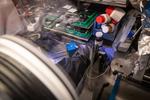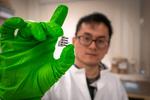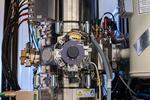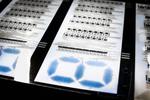Other

“Computers, mobile phones and all other electronic devices contain thousands of transistors, linked together by thin films of metal. Scientists at LiU have developed a method that can use the electrons in a plasma to produce these films. The processors …

“Researchers at Linköping University, working with colleagues in Great Britain, China and the Czech Republic, have developed a perovskite light-emitting diode (LED) with both high efficiency and long operational stability. “Light-emitting diodes based on perovskites are still not sufficiently stable …

“Researchers at Linköping University have discovered a quantum phenomenon that influences the formation of free charges in organic solar cells. “If we can properly understand what’s going on, we can increase the efficiency”, says Olle Inganäs, professor emeritus. Doctoral …

“A research group led by Simone Fabiano at the Laboratory of Organic Electronics, has created an organic material with superb conductivity that doesn’t need to be doped. They have achieved this by mixing two polymers with different properties. In …

“A new method to fit together layers of semiconductors as thin as a few nanometres has resulted in not only a scientific discovery but also a new type of transistor for high-power electronic devices. The result, published in Applied Physics …

“Researchers at Linköping University and RISE, Campus Norrköping, have shown for the first time that it is possible to print complete integrated circuits with more than 100 organic electrochemical transistors. The result has been published in Nature Communications. “This is …

“Researchers at the Laboratory of Organic Electronics have discovered a material that can both increase and reduce its volume when exposed to a weak electrical pulse. In a sponge, or filter, the researchers can control the size of particles that …

“Scientists at Linköping University have shown how a quantum computer really works and have managed to simulate quantum computer properties in a classical computer. “Our results should be highly significant in determining how to build quantum computers”, says Professor Jan-Åke …

“Artificial muscles made from polymers can now be powered by energy from glucose and oxygen, just like biological muscles. This advance may be a step on the way to implantable artificial muscles or autonomous microrobots powered by biomolecules in their …

“Inspired by the behaviour of natural skin, researchers at the Laboratory of Organic Electronics have developed a sensor that will be suitable for use with electronic skin. It can measure changes in body temperature, and react to both sunlight and …
